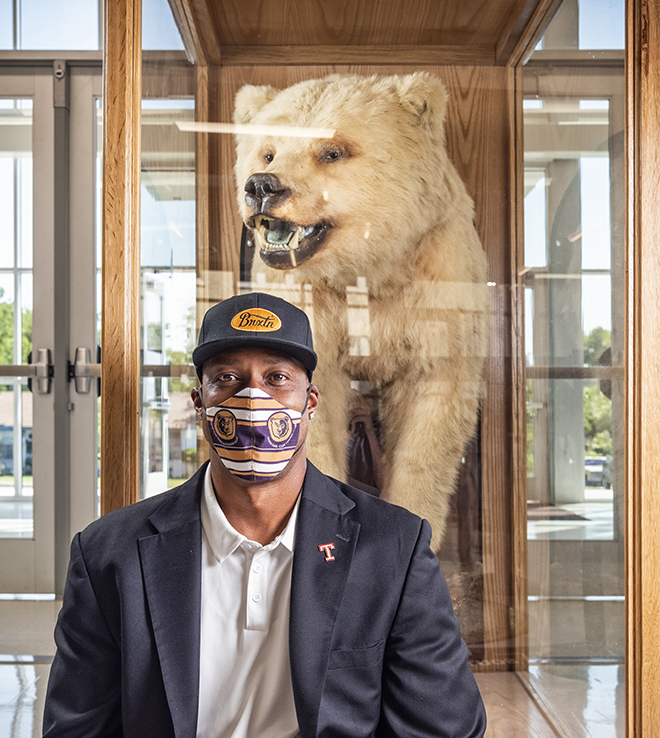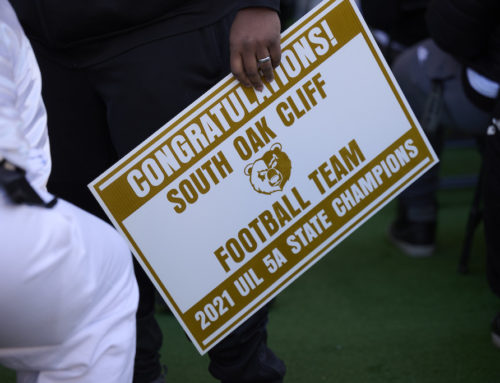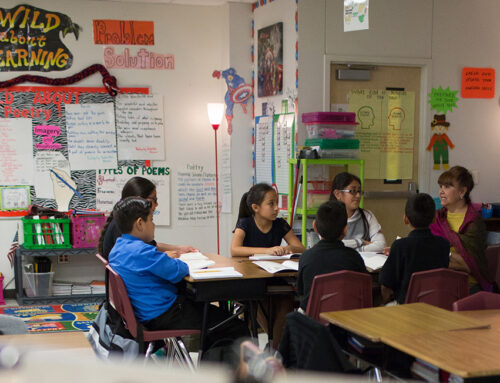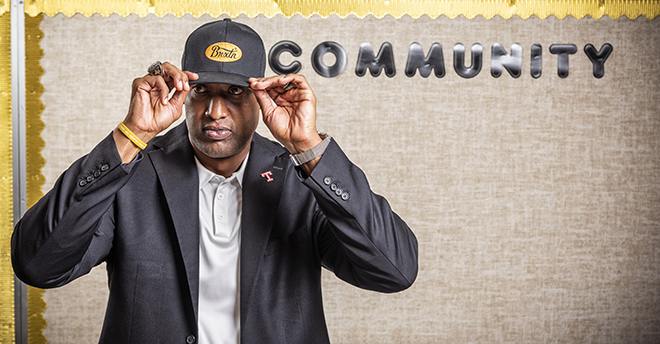
Photography by Danny Fulgencio
Derrick Battie graduated from South Oak Cliff High School in 1992, and he returned as the school’s community liaison, a position he still holds, in 2002.
In between, he was one of the most highly recruited high school basketball players of his class. He started for Temple University in Philadelphia all four years of his college career, playing in the Elite Eight tournament under hall-of-fame coach John Chaney. And he played in the NBA for a few years before blowing out his knee and returning to Oak Cliff to take care of his grandmother.
More recently, Battie was among the SOC alumni who pushed for a $52-million renovation of the school, completed last year.
While a taxpayer-funded Dallas ISD bond paid for the project, Battie and others made sure it was spent sensibly and that the design of the building was perfect, from moving dumpsters away from the student entrance to providing power outlets for the student lounge and creating spaces for robotics practice.
Battie’s is one of the first faces SOC’s 1,300 students see every morning, and they know to be looking sharp when they cross his path. “You better have your pants pulled up,” he says. “You better not be smelling like no cigarettes or marijuana.”
Battie also is a leader that the school’s approximately 50 homeless students and their families can lean on for help.
SOC’s two resource centers, one with shelves full of snacks and school supplies funded by Frito Lay and Feed the Children, and one with a clothes closet provided by Friendship West Baptist Church, are open to the entire school community, Battie says.
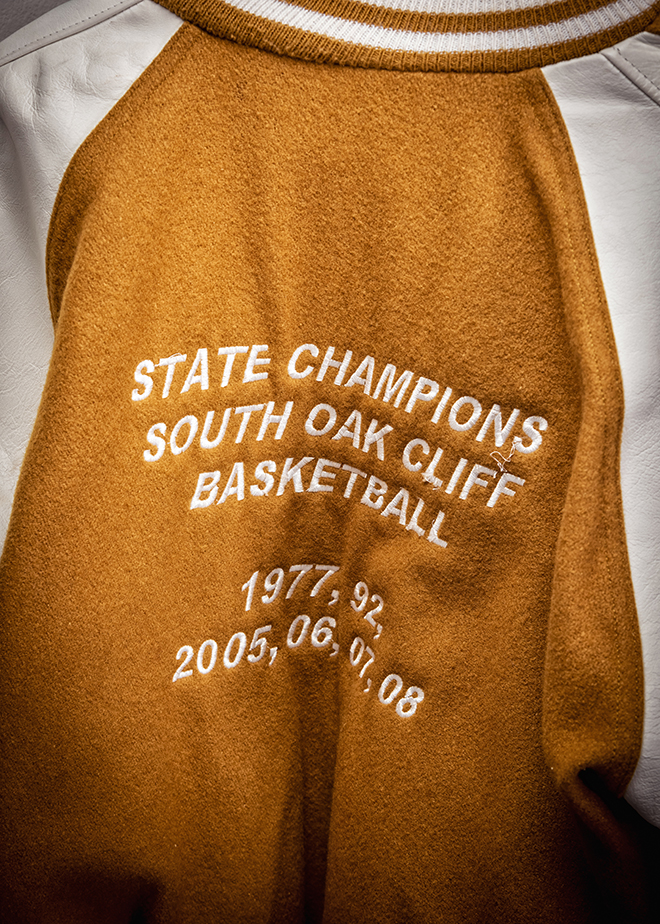
Why SOC should be one of the best schools in Dallas ISD:
When we start thinking and speaking that, it becomes reality. We all can agree that there should be no school with the ceilings falling in and rats running around. We should do everything we can to make sure this environment is totally set for academic growth. No drugs. No guns. No gangs. No bullying. We don’t want that in our building. We have to get [students] ready in four years, and we just don’t have enough time for that. What we do is try to handle it in the community. That way, when they get to school, then the familiar conversations are there.
On community safety:
Our issues are with students having too much trauma because of what goes on in their communities, what goes on in their households, at their parks, at their recreation centers and even at their schools. There was a shooting at [the Ellis Davis Field House] recently. South Oak Cliff High School and Kimball High School were playing a basketball game. So we’re talking about how that emotionally effects children and causes behavior to spiral out of control without social and emotional support.
Putting pressure on leaders:
I’m not emotional about it. I can be friends with you and tell you that you’re not doing a good job. Because what you’re doing affects a whole lot of children who come here, and if they don’t have what they need when they come here, then they couldn’t possibly be ready to exit here in four years. If they’re at home struggling, bullets are flying around their head, there’s no technology. We’re in a technology desert. There’s no access to green grocery stores. There’s a food desert. Look at the schools. Here at South Oak Cliff High School, the alumni and students had to protest in order for them to make an investment into a school in a predominantly Black and Hispanic community. It wasn’t a given. The district is working hard to mend its relationship with this community, and I’m thankful that their leadership is reaching out in an effort to create equity. We haven’t gotten there yet. But at least they’re putting things in place to help.
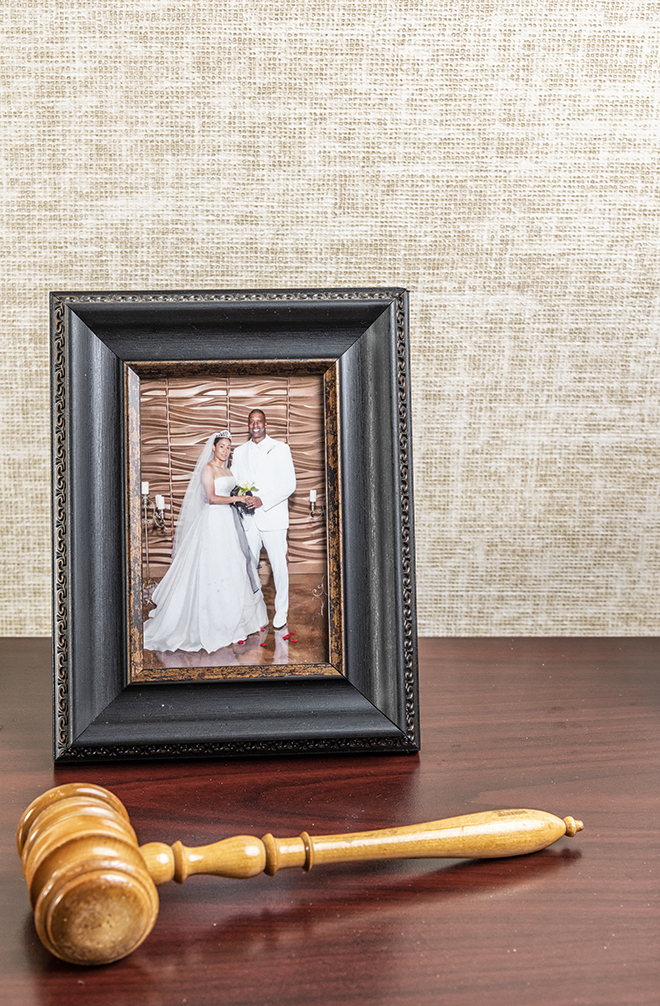
Addressing homelessness and poverty:
It’s a matter of numbers on a check that can fix that. We have five families right now that are facing eviction. The moratorium is ending, and they don’t think they can catch up because they owe back rent. They just can’t get ahead. The only thing that ends homelessness is economic investment in jobs. You cannot beg your way out of homelessness. It just doesn’t work that way. We have to get these people jobs. We’ve got to get them careers. That means education. Whatever the path is, that’s the key out of homelessness, a job. Period.
On pushing for more money for social services:
They say, “Mr. Battie, that’s a big ask.” You need a big ask. That’s a big problem. You can’t ask for a little ask for a big problem. That’s asinine. So yes, sir, Mr. Mayor, I’m asking for a big fix to this problem, because it is a big problem. I don’t get a lot of pushback, I guess, being a former athlete. They know I’m not political. I don’t care about your ambitions for running. All I care about is, when I walk out my doors, when I send my kids home on buses, that they get there safely and they get back to us the next day prepared. We don’t want them coming in saying, “The wifi went out in our community.” When I go home to Plano — my kids stay in Plano — it goes to 5G. Automatically. I looked at my phone, I said, “I didn’t even know I had a five on here.” Certain communities don’t have that support technology-wise. And right now, with everything virtual, and everyone streaming online, how do you think that’s running?
This interview has been edited for clarity and brevity.
